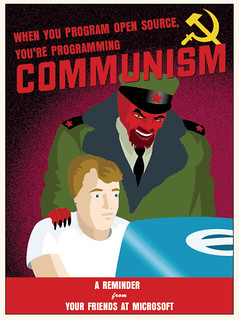Free and open-source software: Difference between revisions
More languages
More actions
Jucheguevara (talk | contribs) m (Link) Tag: Visual edit |
Jucheguevara (talk | contribs) (added funny poster lol) Tag: Visual edit |
||
| Line 1: | Line 1: | ||
[[File:Poster- When you program open source, you're programming Communism..jpg|thumb|A tongue-in-cheek photoshopped poster equating open source development to communism, based on an actual poster from the Recording Industry Association of America claiming that pirating MP3s is "downloading communism"]] | |||
'''Free and open-source software''' ('''FOSS''') is software that is freely licensed to use, copy, etc. as well as having an open-source codebase, without any proprietary elements. | '''Free and open-source software''' ('''FOSS''') is software that is freely licensed to use, copy, etc. as well as having an open-source codebase, without any proprietary elements. | ||
Revision as of 17:58, 9 August 2021

Free and open-source software (FOSS) is software that is freely licensed to use, copy, etc. as well as having an open-source codebase, without any proprietary elements.
FOSS is relevant to this wiki in multiple ways. ProleWiki is built on FOSS software called MediaWiki, but FOSS is also championed by some as being "digital communism", that is -- it embodies both post-capitalism as well as a post-scarcity.
By realizing the historical potential of an "economy of abundance" for the new digital world FOSS may lay down a plan for political resistance or show the way towards a potential transformation of capitalism.
According to Yochai Benkler, Jack N. and Lillian R. Berkman Professor for Entrepreneurial Legal Studies at Harvard Law School, free software is the most visible part of a new economy of commons-based peer production of information, knowledge, and culture. As examples, he cites a variety of FOSS projects, including both free software and open-source.
